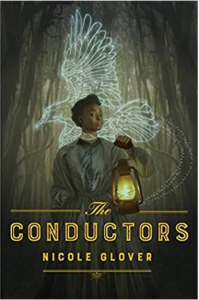Such an excellent premise, such an underwhelming execution!
 Hetty Rhodes was a conductor on the Underground Railroad, helping other enslaved people escape slavery as she once had, using the magical abilities she was gifted with. Once the Civil War ended, she settled in Philadelphia with her husband and co-conductor Benjy Rhodes, but never gave up looking for her younger sister Esther, from whom she’d been separated on their flight to freedom. Now she works as a seamstress by day and, with Benjy, an investigator by night, solving the cases the local police won’t touch, whether out of fear or, more usually, prejudice.
Hetty Rhodes was a conductor on the Underground Railroad, helping other enslaved people escape slavery as she once had, using the magical abilities she was gifted with. Once the Civil War ended, she settled in Philadelphia with her husband and co-conductor Benjy Rhodes, but never gave up looking for her younger sister Esther, from whom she’d been separated on their flight to freedom. Now she works as a seamstress by day and, with Benjy, an investigator by night, solving the cases the local police won’t touch, whether out of fear or, more usually, prejudice.
When the body of a friend of the Rhodes’ is found with a cursed sigil carved into his skin, it’s only natural that they’re the first (and unsurprisingly only) people called in to investigate. Charlie Richardson was a man constantly on the make, who downplayed his own history in order to better mingle with the elites of Black Philadelphia. Hetty had once been bosom friends with his wife Marianne but the two had grown distant, and the fact that Hetty and Benjy had been less than enthusiastic about responding to Charlie’s recent worries increases their guilt at not having been able to prevent his murder. With the help of friends such as mortician Oliver and herbalist Penelope, the Rhodes are determined to find justice for their dead friend, even it means explosive consequences.
The murder mystery itself is decent, but the greatest strength of this novel lies in the examination of Black society and attitudes in the era immediately around the end of the Civil War. Hetty is a compelling protagonist, smart but vulnerable, whose marriage of convenience to Benjy is slowly becoming something more, at least on her end. Benjy is a great help-meet, and the duo balance each other out nicely, skillsets and otherwise. Unfortunately, very little else of the novel feels fully realized. It reads like a first fully written draft, dashed off in haste before being turned in seconds before deadline. The characterizations, in particular, suffer for it. While several of the most important supporting cast members get sketched out believably, I literally could not tell the difference between Hetty’s friends’ and frenemies’ husbands, who all seemed to be cut out of the same faintly odious, usually hostile cloth. I enjoyed the set pieces — the Excursion, especially, with its insight into Black history and culture was really cool — but it sometimes felt like the narrative was just stringing me along between each scene, not really caring about the connecting tissue that makes a novel whole.
It was also a bummer to see the very cool magical concepts get glossed over almost entirely. Black people in this setting use Celestial magic — and I can overlook the idea that they’re using classical Western constellations shorn of any African influence: it’s an obscure field, and not as easy to find concordances as with, say, the melding of Yoruba and Roman Catholic imagery in Santeria — but the star sigils our heroes wield feel infused less with the rigour of a developed system and more with a “what does the author need the sigils to do in order to advance the plot right now” hastiness. I also wish more had been discussed as to the use of Sorcery vs Celestial magic, and thought it kind of gross that the white supremacist overtones attached to the former were what the plot used to allow Benjy to escape suspicion in the end — and at the expense of another Black person, no less!
There were a lot of really great examinations here of what it means to be Black, as well as universal concepts of friendship and romance, but the book overall felt too rough hewn, even for an Advance Reviewer’s Copy. I can grit my teeth past the many egregious typos that read as if the author hadn’t bothered going over her own work even once — those will hopefully get ironed out before the novel hits the market — but I was genuinely disappointed by the lack of depth when it came to characterization and world-building. There’s so much potential here, and I’m hoping Nicole Glover’s craft only continues to improve, as she has some really terrific ideas that just need more work to become something truly spectacular. Especially since this seems like the start of a series: I’ll likely adopt a wait and see attitude before picking up any more of these books tho, given the underwhelming quality of this debut.
The Conductors by Nicole Glover was published today March 2, 2021 by John Joseph Adams/Houghton Mifflin Harcourt and is available from all good booksellers, including
Want it now? For the Kindle version, click here.
